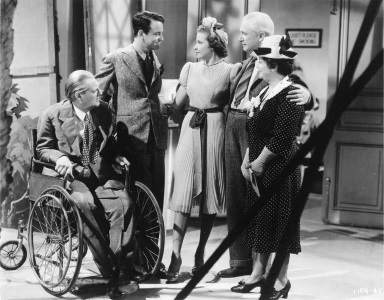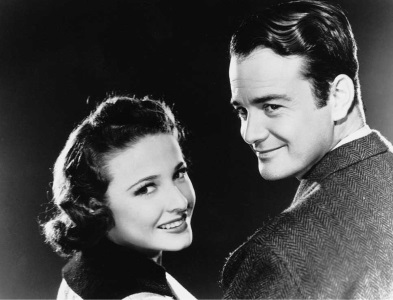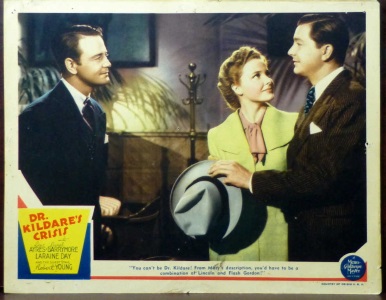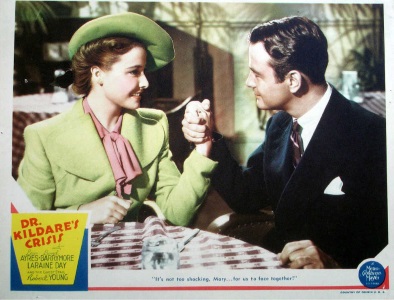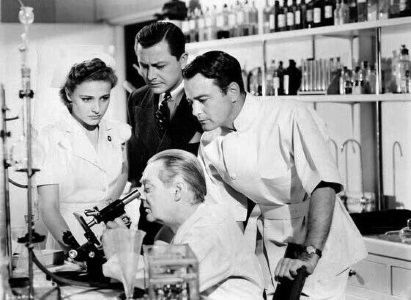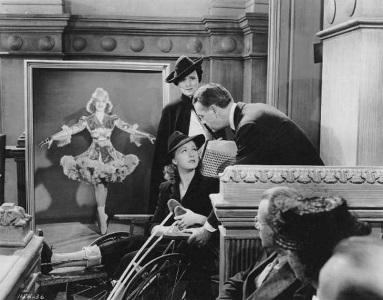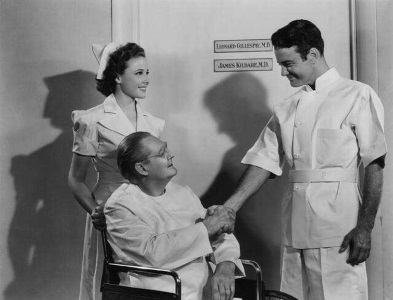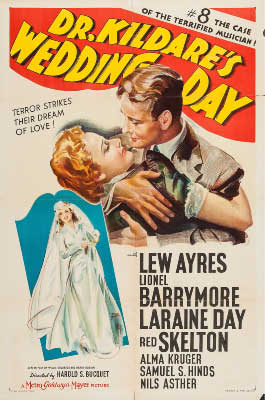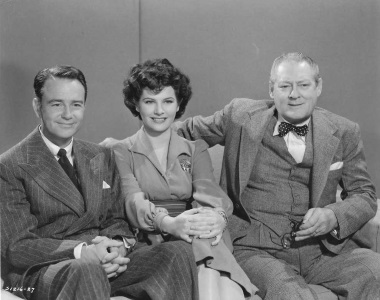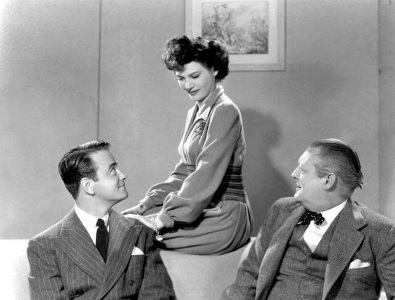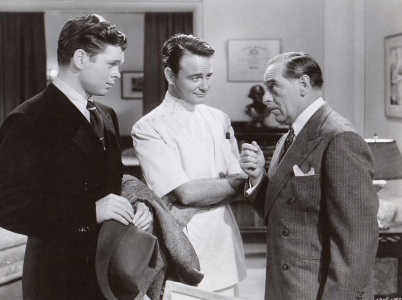The Final Five Films
of the Dr. Kildare Series
Dr. Kildare Goes Home (1940) – 6.0
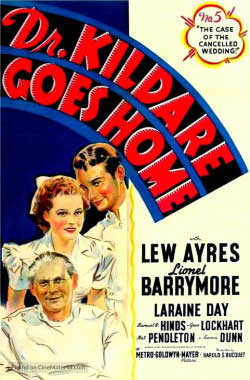
The fifth in the Dr. Kildare series and it is just as homey as all the rest.
All good people and fine doctors. Good to see after I read the other day
that over 250,000 people died in America due to a misdiagnosis in the emergency
room. I think we can feel confident that none of those happened at the Blair
General Hospital with Dr. Gillespie (Lionel Barrymore), Dr Kildare (Lew Ayres)
and Nurse Lamont (Lorraine Day). There is good news for Kildare. He is no
longer an intern at $20 a month. The bad news is that now he can marry Lamont.
But not yet. The usual cast is on hand and it feels comfortable being in
their company. No major drama in this one, just a bit of socialism from the
writers! I wonder if they were ever dragged in front of a Congressional
Committee and called Lefties.
The day that Kildare finds out that he is now a full-fledged doctor, he finds
out from his mother (Emma Dunn) that his father (Samuel Hinds) who is also
a doctor is exhausted from doing his rounds. In the neighboring town the
doctor left and he has had to take on his patients as well. The town
can't find a doctor because it is poor with high unemployment and people
can't afford the few dollars to see a doctor. It was the tail end of the
Depression. Gillespie comes up with fifty percent of the solution. He knows
three doctors who can't find work. Maybe they can go to this town and set
up a clinic. Except the money issue. This is where socialism comes in. Kildare
comes up with a crazy idea, the damn Commie. How about if everyone in town
pays ten cents a week and the town is covered. Obamacare before Obama.
Dr. Kildare’s
Crisis (1940) – 5.0
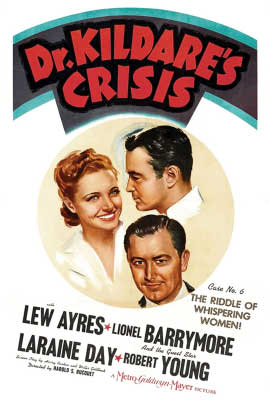
This is the 6th in the Dr. Kildare series of films and if you got this far,
you know exactly what to expect. Some drama, some humor, a touch of romance,
the same cast of lovable characters as in all the films, a homey tale of
mentorship and a large city hospital in which the staff sees every patient
and fixes them up no matter if it is an illness or love. "Call her up and
ask her to marry you." the grumpy curmudgeon advises one patient with stomach
problems. He does and all is fine. Our healthcare system 80 years ago. Now
not so much. Time for a screed from me because there isn't much to say about
this amiable family film.
In Thailand, I was diagnosed with 2 kidney stones. No big deal. I have literally
had dozens. Dug out with a scalpel and a shovel. My doctor who looked like
a Thai version of Doogie Howser advises I have them taken out before they
block fluids from going into my bladder. Cost. $18,000. No insurance in Thailand.
But hell I was coming to America where I have Medicare. So I go to the large
local hospital, ask to see a urologist. Instead I get a phone number. I call
for 3 days. No one answers or returns messages. So I go to a different building
which houses the Urology unit. Ask to see a doctor. Sure. End of July. July?
This is May. Yes July. This would not have happened at Blair General Hospital.
What a shit system we have. A few days later I get a pinched nerve in my
neck. Really painful. I didn't even bother to call a hospital.
Of course, they didn't always get it right back then. The love of Kildare's
life Mary Lamont (Laraine Day) is visited by her brother. Played by Robert
Young. Kildare notices that the brother seems to be hearing things and after
two minutes of research decides the brother has a fatal case of epilepsy.
He tests him with a steak with salt poured on it. Everyone freaks out till
Gillespie asks the brother a question and figures out what is really wrong
with him. Not one of his better days. Always get a second opinion. Which
is really all I wanted here.
The People vs.
Dr. Kildare (1941) – 6.0
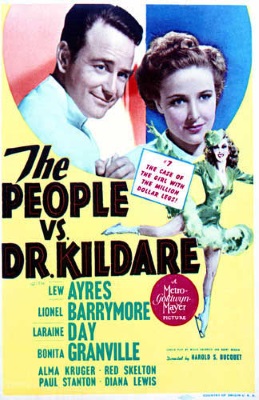
The seventh film in the Dr. Kildare series of nine. All of the regulars are
back - Lew Ayres as Kildare, Lionel Barrymore as Gillespie, Laraine Day as
Nurse Lamont, Alma Kruger as Head Nurse Molly Byrd and Marie Blake as the
gossipy telephone operator (sadly, no Nat Pendleton as comedy relief). But
they add a few other actors of note as well - Tom Conway as the hospital's
lawyer, Red Skelton in an early film role as the orderly and comedy relief
and Bonita Granville as the patient. Granville was Nancy Drew only two years
previously in that four-film series - and here she is a fully formed attractive
woman. How does that happen? It is a solid episode in the series - once again
Kildare and Lamont have to postpone their wedding - and in some ways it is
good to see that not everything has changed since 1941. These days if someone
calls out for a doctor in a packed theater because a person has had a heart-attack,
no one will likely answer because if you try and help and can't save them,
chances are you will be sued. Kildare being the good chap he is learns this
lesson.
He and Lamont are driving along when they witness a car and a truck crash
into one another. Instead of just driving away like any sensible doctor would
do now, he stops and mends everyone - but Granville has a ruptured spleen
and he surmises will die if not operated on immediately. So, he does it on
the road with a bag of instruments and Lamont urging him on. That turns out
to be fine - but her leg was also fractured - and when she gets out of the
hospital 8 weeks later - I wonder what the bill was - her leg is paralyzed.
Kildare and Gillespie have no idea why but she gets a shark and sues for
$100,000. She was a professional ice skater and sues for everything
under the sun and moon. If she wins the case, it will be the end of Kildare's
career. And we can't let that happen.
Dr. Kildare’s
Wedding Day (1941) – NR
The eighth of nine films in the Dr. Kildare series. I won't say much about
this one other than it was a kick in the head. About the last thing I expected.
I hated it.
Dr. Kildare’s
Victory (1942) – 5.0
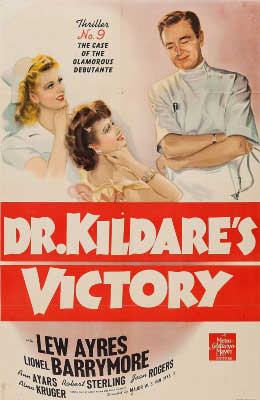
This is the 9th and last film in the Dr. Kildare series. It ran from 1938
to 1942 with Lew Ayres as Kildare in all of them. Joel McCrae was Kildare
in the first film (1937) but that was meant to be a standalone film that
MGM then decided to make into a series. He starts off as a fresh-faced intern
from the sticks and ends with him as a top doctor still fighting for his
patients and often against the board of the hospital. It is always a little
bit sad for me when one of these series from the 1940s come to an end. Over
the series, you get to know the characters and like them. Most of them are
B films or soon become ones after the first couple and their lack of imagination
and creativity becomes comfort food. When their popularity begins to wane,
the studio cuts them off without hesitation.
I am not sure if that was the case with the Kildare series. The downbeat
eighth film though sort of foretold that the series was coming to an end.
There was nowhere for it to go really. In this film it looks like they may
be setting up another young doctor to carry on the concept but that never
happened and in fact it was the crotchety Dr. Gillespie (Lionel Barrymore)
who went on to his own series. But the stake that certainly killed the series
was WW II and Lew Ayres's decision to declare himself a conscientious objector.
That was not a popular move in 1942. To his credit, he trained as a medic
and entered the Pacific War in very dangerous circumstances. He should just
have used bone spurs as his excuse. He didn't make another film till 1945.
Dr. Kildare in the Pacific would have made a great film.
This one is similar to the early films - a number of small subplots are interwoven
with none of them dominating the film. After the bummer of the previous film,
none of it feels important and a dour mood is constantly present. Kildare
is nearly fired by the Board once again but Gillespie saves his bacon once
again. Much of the same group of actors are present and they were to continue
on to the Dr. Gillespie films. The first film in the new series was shot
in this same year, so they didn't miss a beat.
